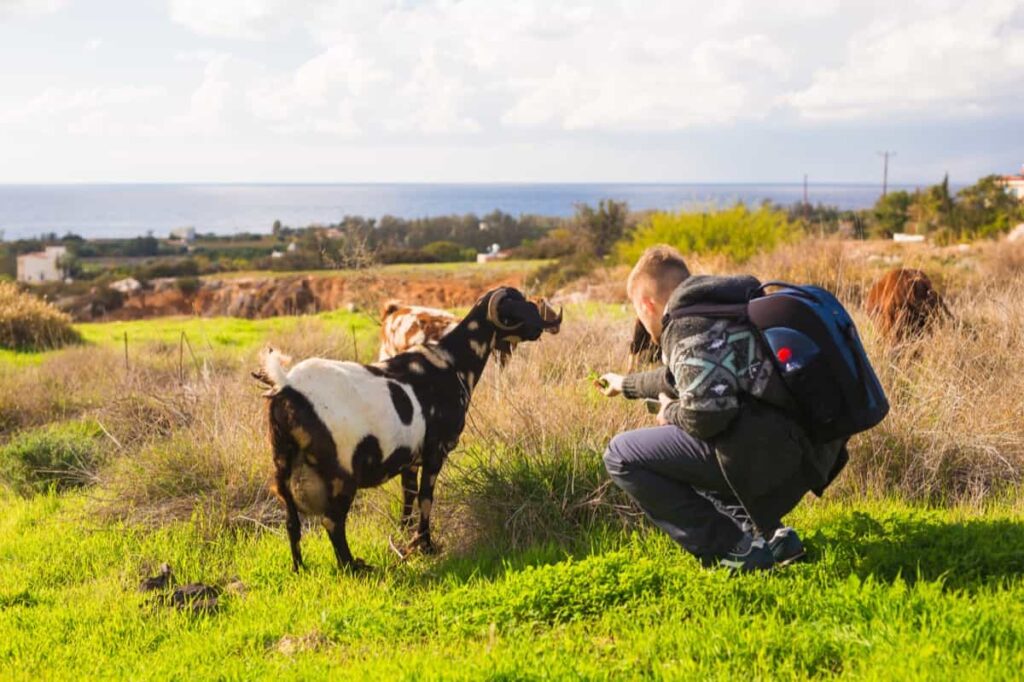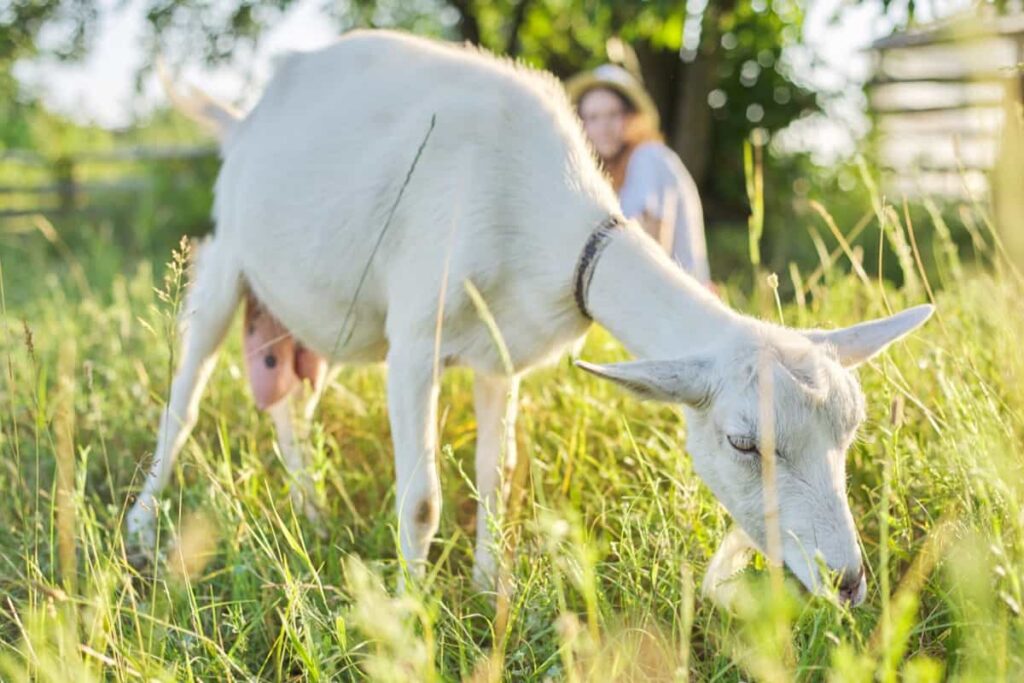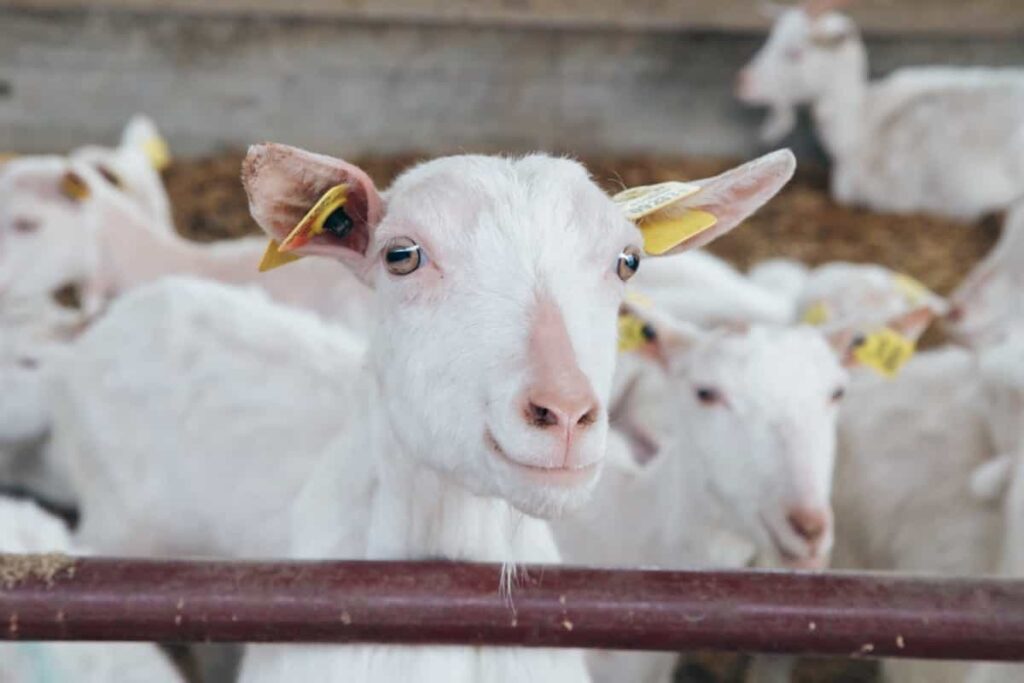Pregnant goats have specific needs that must be met for a successful pregnancy. Goat farming is the practice of raising goats for different purposes, such as milk, meat, and fiber production. It has been a traditional agricultural activity in many parts of the world for centuries. A balanced diet of high-quality hay or alfalfa and free-choice minerals should be provided throughout gestation.

Housing and Fencing for Pregnant Goats
- The size of the shelter should be spacious enough to accommodate both the expecting mother and any other goats that may be sharing the space. This will ensure that she has plenty of room to move around comfortably.
- Providing a clean and dry surface for your pregnant goat is important. Straw or wood shavings can be bedding to keep her comfortable during this crucial time. Regular shelter cleaning is also essential to maintain good hygiene and prevent potential health issues.
- Fencing is another important aspect of goat care during pregnancy. A sturdy fence will keep predators out and prevent your pregnant goat from straying too far away from her designated area. Electric fences can be effective in ensuring their safety and security.
- It’s worth noting that pregnant goats have different nutritional needs compared to non-pregnant ones, so providing them with a balanced diet is vital for their overall well-being. Always consult a veterinarian or an experienced goat breeder for specific dietary requirements based on each goat’s needs.
Pregnant Goat Care
- Caring for a pregnant goat requires attention to ensure the health and well-being of the mother and her unborn kids.
- It’s essential to provide proper nutrition for your pregnant goat. A balanced diet of high-quality alfalfa/hay, fresh water, and free-choice minerals is crucial throughout gestation. While grain can be continued while milking, it is not necessary during early pregnancy.
- Regular health checks are also vital during pregnancy. Keep an eye out for any signs of illness or discomfort and consult with a veterinarian if needed. Vaccinations should be kept up-to-date according to a recommended schedule.
- Grooming plays the main role in maintaining the overall well-being of your pregnant goat. Regularly brush their coat, trim hooves when necessary, and ensure clean bedding.
Grooming Your Pregnant Goats
- Grooming is vital to your pregnant goat’s overall health and well-being. Regular grooming not only keeps your goat looking beautiful, but it also helps prevent skin conditions and promotes good circulation.
- Start by brushing your pregnant goat’s coat regularly to remove dirt, debris, and loose hair. This will help maintain a clean and healthy coat while reducing the risk of matting or tangling.
- Next, please pay attention to their hooves. Trim them every four to six weeks to prevent overgrowth and potential hoof issues. A clean and properly trimmed hoof ensures that your pregnant goat can walk comfortably without any pain or discomfort.
In case you missed it: Goat Breeding and Genetics for Improved Productivity and Disease Resistance

Vaccination Schedule for Pregnant Goats
- Vaccinations help protect against common diseases and illnesses that can pose a risk to both the mother and her unborn kids.
- It is important to consult with your veterinarian regarding which vaccines are necessary for your region and herd. Generally, there are several standard vaccinations recommended for pregnant goats.
- One commonly administered vaccine is the CD&T vaccine, which protects against Clostridium perfringens types C and D and tetanus. This vaccine helps prevent deadly diseases like enterotoxemia and tetanus in adult goats and their offspring.
- Another essential vaccination is for Caprine Arthritis Encephalitis (CAE). CAE is a viral disease that affects both adult goats and newborn kids. Vaccinating pregnant goats against CAE can minimize the chances of transmitting this debilitating illness to their young ones.
- Additionally, some breeders may choose to vaccinate their pregnant goats against other diseases, such as Caseous Lymphadenitis (CL) or Brucellosis. These vaccines can provide added protection depending on geographical location and herd.
- Regularly review your vaccination schedule with your vet so they can make any necessary adjustments based on changes within your herd or new disease threats in your area.
Nutrition and Diet Guidelines for Pregnant Goats
- Proper goat nutrition is important for the health and well-being of any pregnant animal, including goats. Providing pregnant goats with a balanced diet ensures a healthy mama and baby.
- Ensure your pregnant goat has access to fresh, clean water.
- In terms of food, offering high-quality 50/50 alfalfa/hay in free-choice amounts is highly recommended. This type of forage provides essential nutrients like protein and fiber that are vital for the mother goat’s health and the development of her growing kid.
- Additionally, allowing your pregnant goat to have free-choice minerals throughout the gestation period can help ensure she receives all the necessary vitamins and minerals for a successful pregnancy.
- While it’s important to provide grain while milking your goats, they don’t need this additional feed during the early stages of pregnancy. Providing ample amounts of good quality hay, pasture, and mineral supplementation.
What Problems Do Pregnant Goats Have?
- Toxemia and Ketosis are two conditions that pregnant goats need to be closely monitored for. These conditions occur in the last days of pregnancy and can lead to death if not corrected quickly.
- Another issue to watch out for is Hypocalcemia, known as milk fever. This condition occurs when there is a sudden drop in calcium levels in the goat’s body after giving birth. It can cause weakness, muscle tremors, and even paralysis if not treated promptly.
- Mastitis is another problem that pregnant goats may encounter. This mammary gland inflammation can make nursing painful or impossible for the mother and her kids.
- A congested udder is also something to be aware of during goat pregnancy. If the udder becomes swollen or clogged with milk, it can lead to discomfort and potential complications.
- A prolapsed uterus is a serious condition where part or all of the uterus protrudes from the goat’s body before kidding. Immediate veterinary attention is required as this situation can be life-threatening.
- Goat owners must educate themselves about these potential issues to be prepared to provide necessary care or seek professional help. Regular health checks throughout pregnancy should be conducted by an experienced veterinarian who will monitor any signs of these problems developing.
In case you missed it: A Guide to Small-Scale Rural Goat Farming: Tips, Tricks, and Best Practices

Conclusion
Pregnant goat care is an integral part of goat farming. When a female goat becomes pregnant, it undergoes certain physiological changes to prepare for the upcoming birth. As a goat farmer, providing proper care and attention is crucial to ensure the mother’s and her offspring’s health and well-being.
- Types of Grass Growing for Goat Farm
- How to Train Goats for Milking: A Beginners Guide
- Goat Milking Practices and Equipment: A Beginner’s Guide
- Goat Farming for Fiber: Producing Mohair and Cashmere
- Maximizing Goat Milk Production: Tips for Dairy Goat Farmers
- Goat Farming as a Family Business: Strategies for Success
- Profitable Kenya Goat Breeds for Commercial Dairy and Meat Business
- Unlock the Secrets of Oberhasli Goat: Discover Raising and Management Practices
- Ultimate Guide to Myotonic Goats: Explore Profile to Raising
This is encouraging.